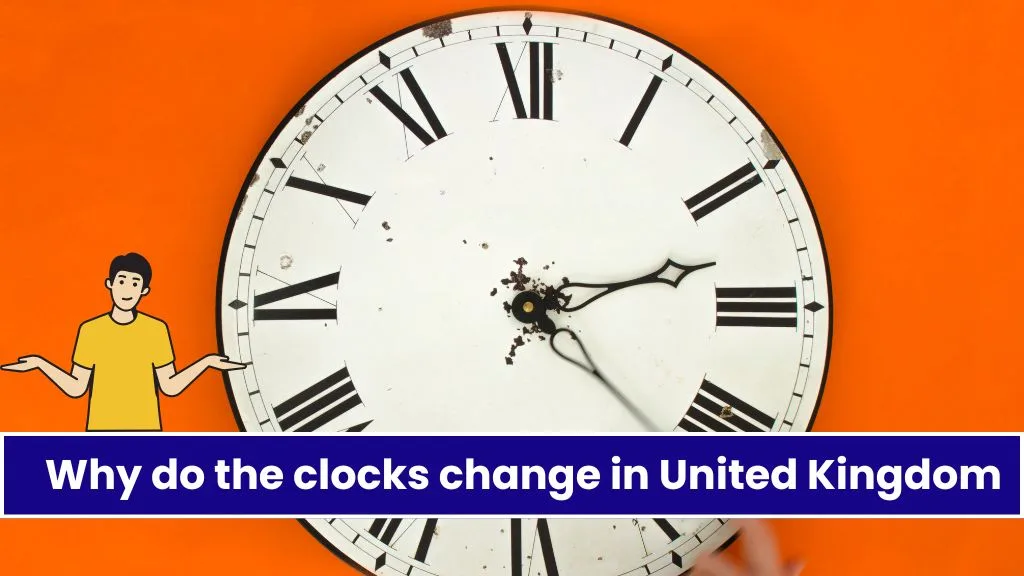Why do the clocks change in United Kingdom: In the UK, clocks change twice a year—moving forward an hour in spring and back an hour in autumn. This tradition is part of daylight saving time (DST) and helps us make the most of daylight during the changing seasons. Let’s explore the history, purpose, and fun facts about why clocks change, and discover when the changes will happen in 2025 and 2026!
Why Do Clocks Go Forward and Back in Great Britain?
- Spring Forward: On the last Sunday in March, the UK sets clocks forward an hour, moving into British Summer Time (BST). This means sunrise and sunset happen an hour later, giving us lighter evenings.
- Fall Back: On the last Sunday in October, the clocks return to Greenwich Mean Time (GMT), bringing earlier sunrises and darker evenings.
When Do the Clocks Change in England?
Here are the dates for the next two years:
2025
- Clocks go forward: Sunday, 30 March 2025, at 1 am (lose 1 hour of sleep).
- Clocks go back: Sunday, 26 October 2025, at 2 am (gain 1 hour of sleep).
2026
- Clocks go forward: Sunday, 29 March 2026, at 1 am.
- Clocks go back: Sunday, 25 October 2026, at 2 am.
| Year | Clocks go forward | Clocks go back |
|---|---|---|
| 2025 | 30 March | 26 October |
| 2026 | 29 March | 25 October |
| 2027 | 28 March | 31 October |
What are the arguments for and against changing the clocks?
Today people argue that changing the clocks will be good for:
- reducing energy consumption for environmental reasons
- having longer evenings to support leisure and tourism
- encouraging people to exercise more outdoors
- reducing road accidents.
However, opponents of British Summer Time have presented arguments against daylight saving time, from safety concerns about darker mornings to farmers worried about the effect of changing routines for livestock.

Source: https://www.rmg.co.uk/stories/topics/when-do-clocks-go-forward
Others argue that changing the clocks is now redundant given that many of us spend most of our time in well-lit homes, shops and offices, where the amount of daylight makes little difference to our lives.
It’s an ongoing debate that strongly depends on people’s geographical location, occupation and lifestyle.
What Is Daylight Saving Time in UK?
Daylight saving time is a practice where clocks are adjusted to make better use of daylight. In spring, the clocks move forward by an hour, giving us longer evenings. In autumn, they go back an hour, bringing earlier sunrises in winter. This simple shift helps us enjoy more daylight throughout the year.
Who Invented Daylight Saving Time?
The idea of daylight saving time dates back to Benjamin Franklin in 1784. He suggested adjusting clocks to save on candles during summer. Later, in 1895, George Hudson, a New Zealand astronomer, proposed a two-hour shift to make time for evening activities.
In the UK, the concept gained traction thanks to William Willett in 1907. After noticing how people were wasting daylight by sleeping in, he campaigned for clocks to be moved forward in summer. Although he didn’t live to see it, his idea was implemented during World War I to save fuel.
When Did Daylight Saving Time Start?
The first formal use of daylight saving time was in Germany in 1916, during World War I, to conserve energy. The UK followed shortly after, and the USA adopted it in 1918. However, the very first recorded use was in Port Arthur, Canada, in 1908.
How Many Countries Use Daylight Saving Time?
Around 70 countries worldwide observe daylight saving time. Most of these are in Europe, North America, and parts of the Southern Hemisphere. In Australia and Namibia, clocks are adjusted opposite to the UK because their seasons are reversed!
Why Does the UK Use GMT?
The UK was one of the first countries to adopt standardized time. In 1880, Greenwich Mean Time (GMT) became the UK’s official time standard. This was essential for coordinating railway timetables and ensuring smoother travel across the country.
Today, GMT is recognized globally as a time standard, and landmarks like Big Ben and the Corpus Chronophage remind us of its significance.
Fun Facts About Clock Changes
- Extra Sleep: When clocks go back in October, you gain an extra hour of sleep!
- Shorter Day: When clocks go forward in March, it feels like we lose an hour of the day.
- Historic Timekeeping: Before standardized time, UK towns used local solar time, guided by sundials. Some historic sundials can still be seen in castles and cathedrals today.
The practice of changing clocks is rooted in history and continues to serve practical purposes like energy conservation and better use of daylight. Whether it’s enjoying longer summer evenings or waking up to brighter winter mornings, daylight saving time connects us with the rhythms of nature and history.
So, the next time you adjust your clock, think about the inventors and pioneers who made it possible and the brighter days ahead!
Why do the clocks change in the UK?
The UK changes clocks to observe daylight saving time, making better use of daylight by shifting one hour forward in spring and one hour back in autumn.
When do the clocks go forward in 2025?
In 2025, clocks go forward on Sunday, 30 March, at 1 am. This marks the start of British Summer Time (BST).
When do the clocks go back in 2025?
In 2025, clocks go back on Sunday, 26 October, at 2 am, returning to Greenwich Mean Time (GMT).
Who invented daylight saving time?
Daylight saving time was first proposed by Benjamin Franklin in 1784, later refined by George Hudson and William Willett for practical implementation.
Why does the UK use Greenwich Mean Time (GMT)?
The UK adopted GMT in 1880 as a standardised time for railways and communication, becoming a global time standard.
Why do the clocks change at the weekend?
The decision to change the clocks on a Saturday night/Sunday morning was made because it would be the least disruptive option for schools and businesses.
Will my phone automatically update the time?
Most devices with internet connection, such as smartphones, should automatically update themselves. However, watches and clocks in cars and kitchens for example may not change automatically, so make sure you are ready to wind forward.











